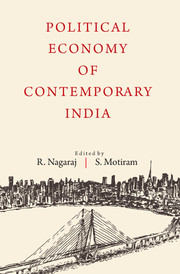Book contents
- Frontmatter
- Contents
- List of Tables and Maps
- List of Figures and Pictures
- Preface
- 1 Introduction: From ‘Intermediate Regime’ to Crony Capitalism
- Economy-wide Considerations
- Political Economy by Regions of India
- Urban Labour Markets
- Land and Rural Labour
- 9 Peripheral Agriculture? Macro and Micro Dynamics of Land Sales and Land Use Changes in the ‘Rural’ Economy of Kancheepuram
- 10 Infrastructures of Growth, Corridors of Power: The Making of the SEZ Act 2005
- 11 Land-based Financing for Infrastructure: What is New about India's Land Conflicts?
- 12 Political Economy of Land Acquisition and Resource Development in India
- 13 Advice and Dissent: The Federal Politics of Reforming India's Land Acquisition Legislation
- 14 ‘Workers’ or ‘Beneficiaries’: The Varied Politics of NREGA Implementation in South-West Madhya Pradesh
- About the Contributors
- Index
9 - Peripheral Agriculture? Macro and Micro Dynamics of Land Sales and Land Use Changes in the ‘Rural’ Economy of Kancheepuram
from Land and Rural Labour
Published online by Cambridge University Press: 08 February 2018
- Frontmatter
- Contents
- List of Tables and Maps
- List of Figures and Pictures
- Preface
- 1 Introduction: From ‘Intermediate Regime’ to Crony Capitalism
- Economy-wide Considerations
- Political Economy by Regions of India
- Urban Labour Markets
- Land and Rural Labour
- 9 Peripheral Agriculture? Macro and Micro Dynamics of Land Sales and Land Use Changes in the ‘Rural’ Economy of Kancheepuram
- 10 Infrastructures of Growth, Corridors of Power: The Making of the SEZ Act 2005
- 11 Land-based Financing for Infrastructure: What is New about India's Land Conflicts?
- 12 Political Economy of Land Acquisition and Resource Development in India
- 13 Advice and Dissent: The Federal Politics of Reforming India's Land Acquisition Legislation
- 14 ‘Workers’ or ‘Beneficiaries’: The Varied Politics of NREGA Implementation in South-West Madhya Pradesh
- About the Contributors
- Index
Summary
Introduction
On the outskirts of Chennai, land is increasingly being converted from the agricultural to the non-agricultural, a process that is often mediated by land sales. This phenomenon confirms recent findings that agricultural land markets are active and that institutional constraints on the sale of agricultural lands are less of an impediment than they were twenty years ago. So how do these land markets function and what are the implications of such markets for agriculture? There are two broadly divergent views about agricultural land markets. The first sees agricultural markets as a way to improve efficiency of agriculture. The second situates such markets in wider processes of development and capital accumulation and often associates it with land grabbing both within and outside of agriculture. We argue that while the activation of agricultural land markets is the result of particular priorities of development, there is a need for a more regionally grounded conceptual and empirical analysis that discloses how state policies impact land markets, what the micro-politics of land sales entail and how such land transactions affect different categories of farmers. By doing so, we also hope to interrogate the over-simplistic use of the tag land grab that often conceals more than it reveals.
Our discussion takes place in the context of Tamil Nadu's socio-economic development over the last two decades which has been characterized by two important features. First, the economy has witnessed a higher overall growth rate than that of the country as a whole. Coupled with declining rates in fertility and advances in public access to education and healthcare, this growth has been accompanied by higher per capita incomes and improvements in human development (Dreze and Sen, 2013; Kalaiyarasan, 2014). Second, despite having witnessed high levels of both economic growth and social development, the agricultural sector has been stagnant with one of the lowest rates of growth of output in the country and a decline in the gross cropped area (Bhalla and Singh, 2009). While declining returns to agriculture and the accompanying crisis has been an all-India phenomenon, it has been more acute in Tamil Nadu (Vijayabaskar, 2010). Moreover, despite relatively high growth rates in certain sub-sectors of agriculture in the recent past agricultural income, as well as returns from farming, have declined.
- Type
- Chapter
- Information
- Political Economy of Contemporary India , pp. 205 - 229Publisher: Cambridge University PressPrint publication year: 2016
- 1
- Cited by



